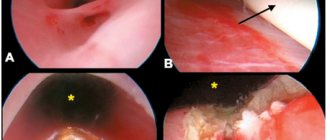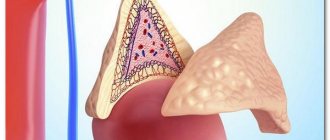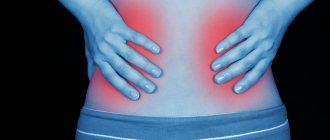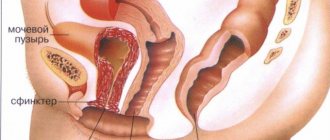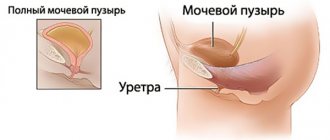Diseases of the genitourinary system are considered one of the most common. These include inflammation of the ureter in women and men. The organ plays a key role in the process of urination and the normal functioning of the entire body. More often, females are susceptible to ureteritis (another name for inflammatory processes in the ureter), which is determined by the structural features of the organs of the female urinary system.
Symptoms in women and men
Often, inflammatory processes in the ureter in women are provoked by cystitis, pyelonephritis and urethritis. Infections end up in the ureter from other organs of the genitourinary system. In the initial stages of urethritis, a person feels exclusively the symptoms of the pathology that caused the inflammatory processes. For example, when inflammation of the ureter in men and women occurs due to urolithiasis, patients experience a number of symptoms:
- sharp and acute pain in the lumbar region;
- transfer of pain to the groin, peritoneum, external genitalia;
- increased body temperature;
- increased blood pressure;
- nausea;
- gagging;
- increased frequency of urination;
- pain when urinating.
If the inflammation of the ureters is provoked by cystitis, patients feel a burning sensation, pain and pain when urinating, a frequent urge to empty the bladder, which is often accompanied by a feeling of incomplete urine output. As the disease develops due to urethritis, patients feel pain when urinating and an increase in the number of urges. In cases where diseases of the ureter are observed due to pyelonephritis, patients experience pain and aching pain in the lumbar region, general poor health and signs of poisoning.
As ureteritis progresses, patients experience a decrease in the symptoms of the underlying disease and begin to feel the following signs: pain in the ureters, pain during urination and increased frequency, change in the color of urine, which becomes whitish and cloudy, sometimes with a small amount of blood and pus. People may experience general malaise, increased fatigue, decreased appetite, bouts of nausea, headaches, and fever accompanied by chills.
What reasons?
Most often, inflammation of this organ begins with some other disease.
If we summarize the main reasons , the following stand out:
- Urolithiasis is the most common cause of pathology. As a rule, stones make urination difficult; retained urine becomes a source of inflammatory processes;
- pathological manifestations in the kidneys, most often pyelonephritis;
- urethritis of the urethra;
- cystitis - this inflammation of the urinary cavity tends to spread very quickly;
- disruption of innervation - the work of nerve endings that promptly signal the need to urinate;
- congenital pathology, sometimes thickening or narrowing of the ureter also impedes the outflow of urine, which provokes many inflammations of various types.
Diagnosis of ureteritis
An inflamed ureter is diagnosed using the following examinations:
- urography (x-ray contrast study of the activity of the kidney and urinary tract);
- blood chemistry;
- general analysis of urine and blood;
- ultrasound examination of the ureter and kidneys;
- cystoscopy (examination of the inner surface of the bladder, which is carried out using an endoscope);
- urethroscopy (examination of the urethra using a urethroscope);
- ureteral catheterization.
When checking a blood test, specialists pay attention to possible changes in indicators towards the inflammatory process. We are talking about an increased concentration of leukocytes, the appearance of proteins and an increase in the erythrocyte sedimentation rate. There is often the presence of blood in the urine. During urography, doctors pay attention to disruptions in the outflow of urine and the presence of stones in it.
Functions of the organ
The urinary system performs the following vital functions:
- emission of waste products;
- support of water-salt balance;
- synthesis of hormones.
The function of the ureters is to transport urine, which is ensured by:
- motor;
- autonomous;
- rhythmic system of contractions.
Rhythmic contractions are generated by a pacemaker or pacemaker. It is located at the top of the pelvic anastomosis. Contractions change when the body position changes, the rate of urine production changes, and when the person’s nervous state changes. Smooth muscles contract due to the concentration of calcium ions. The pressure difference ensures the perfusion (transport) of urine. At the same time, coordination with the bladder prevents the reverse flow of fluids - reflux.
Inflammatory processes in the ureters during pregnancy
Often, infections in the ureter are observed in pregnant women. This is primarily due to the structure of their genitourinary system and reduced immunity, which is why diseases of any nature develop faster. In addition, the uterus increases in size and begins to put pressure on the organs of the urinary system, which causes an unstable outflow of urine and, as a result, inflammation.
During pregnancy, doctors prescribe medications for ureteritis to pregnant women with extreme caution, since many of them are strictly contraindicated for pregnant women. Doctors agree that in cases where a woman was diagnosed with an infection in the ureter during pregnancy, it is better to treat it in a hospital. The patient is prescribed a course of mild antibiotics and medications that can support and improve immunity. It is important to remember that self-medication for ureteritis is strictly not recommended. The required drug and its dosage can be prescribed exclusively by the attending doctor, based on the individual characteristics of a particular patient.
Blood supply to the area
All parts of the ureters are filled and nourished by arterial blood. The vessels are located in the adventitial part of the membrane, and from them capillaries pass into the organ.
In the upper part, arterial branches arise from the renal artery. The middle section is connected by the common internal iliac artery and the abdominal aorta. The lower portion is fed by branches of the iliac arteries, such as the cystic, uterine and rectal. In the abdominal region, the plexus of vessels is located in front of the ureter, and in the pelvic region - behind it.
As for venous blood flow, it is provided by the veins of the same name, located near the arteries. Blood from the lower part of the organ drains into the internal iliac veins, and from the upper part into the testicular veins. The flow of lymph is ensured by the lumbar and internal iliac lymph nodes.
How to treat an inflamed ureter?
The disease is treated using two methods: drug therapy and surgery, but less frequently. However, to begin with, specialists establish the cause that provoked the development of ureteritis. In cases where the disease appears due to kidney stones, they often resort to crushing them with ultrasound. Cystitis also contributed to the appearance of the disease; the patient will need to undergo a course of treatment, which includes a variety of tablets. They work against the bacteria themselves and eliminate the inflammatory process.
Conservative treatment
The doctor treats ureteritis based on what caused the disease. If ureteritis is caused by kidney stones, experts prescribe antispasmodic medications and tablets that act on the stones, dissolve them and remove them along with urine. In addition to medications, the patient will need to follow a special diet, which is prepared by the doctor based on the individual characteristics of the patient’s body.
The main medicine used to treat inflammation of the ureter is an antibiotic. The medicine fights bacteria directly, preventing secondary infection. In addition to antibiotics, patients are prescribed anti-inflammatory and uroseptic drugs. Painkillers are used to relieve pain, and intravenous solutions of salt and glucose are used to reduce intoxication. A diuretic medication is also used, which works by affecting increased urine production.
Surgery
In cases where inflammatory processes develop due to the innervation of the ureter, specialists perform surgery, during which the denervated area of the organ is eliminated. In addition, surgery is also prescribed in cases of urolithiasis, when the stone remains in the ureter for a long time and does not come out of it. Because of this, the walls become inflamed, so doctors cut out a section of the ureter and restore its patency.
Folk remedies
The healing properties of many plants have long been used to get rid of inflammation of the urinary system. Successful:
- Cranberry – has a pronounced diuretic and anti-inflammatory effect. Daily consumption of juice squeezed from cranberries will have a beneficial effect on the course of the disease.
- You need to brew tea from the leaves and berries of black currant. This will relieve the inflammatory process, and if you add a few linden blossoms, your immune indicators will increase.
- A warm bath of St. John's wort, chamomile, and string can improve a person's condition and relieve discomfort.
Prevention of the disease, timely diagnosis of the cause of inflammation of the ureter, is the main guarantee of recovery.
Prevention of inflammation of the ureter
To avoid conditions when the ureter becomes inflamed with an exacerbation of burning sensation and acute pain, experts recommend adhering to a number of simple rules. First of all, it is important for a person to control the emptying of the bladder and ensure that it is not in an overfilled state for a long time. Doctors recommend leading an active lifestyle and playing sports, since physical activity will help women avoid stagnation in the pelvis. However, it should be noted that you should not overload yourself with physical activity, since excessive amounts can harm the body and injure muscle tissue.
It will be useful to maintain a proper and balanced diet, in which the consumption of food that acts as a bladder irritant will be limited. Such foods include highly salted, spicy and fatty foods, smoked meats, spices, onions, garlic and horseradish. It would also be useful to reduce salt intake, as well as quit smoking and drinking alcoholic beverages. It is recommended to exclude from the diet too strong coffee and tea, soda, chocolate, citrus juices, mayonnaise, too fatty sour cream and yogurt, bites, salty cheese and tomatoes.
Importance of the department
In clinical medicine, the importance of the intramural section of the ureter is due, firstly, to the fact that it is a natural anti-reflux mechanism that does not allow urine to flow back during urination in healthy people when intravesical pressure increases. Secondly, in this section, the presence of small stones is most often observed, which, due to common innervation with the bladder, can clinically manifest not only in the form of renal colic, but also in the form of dysuria. Intramural section of the ureter - where is it? And what is this? Let's take a closer look at all these questions and talk about the features of treating urolithiasis.


